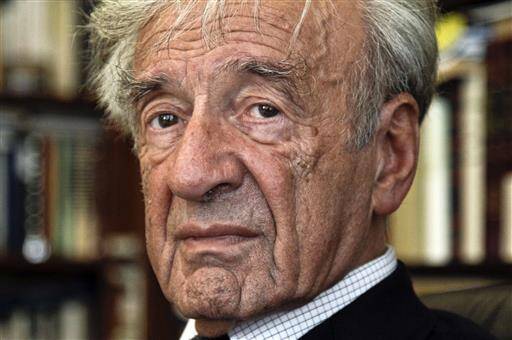The conscience of our world has died.
Elie Wiesel was 87 and his life was marked by the evil he was a personal witness to:
The Holocaust.
He was a teenager when that happened.
At a time of life when one should be preoccupied by school and friends and dreams, the young Wiesel came face to face with the incomprehensible.
His family was eradicated, along with countless others.
As a result, he became an eternal witness to that dark Night.
For the rest of his earthly days, he was consumed by that experience.
He was propelled to urge his fellow human beings to remember the evils that can—and still—contaminate the human soul.
And yet, while he experienced the horror, he held fast to hope that somehow still remained in his own heart.
Inexplicably, he managed to emerge as a man of faith from the faithless world he had had to endure.
He spoke, he wrote and he pleaded about what was done.
He begged for an end to the hatred, the blind hatred that can grip otherwise rational man.
He railed against the attempt to exterminate a people simply because of their heritage and their faith—simply because of their being Jewish.
He preached justice, peace and remembrance.
He extolled humanity while at the same time he reproached it.
With his serious and sad countenance—and an unruly head of gray hair—he appeared like a prophet and was prophetic in his utterances.
It seemed at times that his words were carried away by the winds, for at times the hearers were many and the listeners were few.
He spoke out anyway.
He could not do otherwise.
He owed it to those who perished and he owed it to the living and he owed it to history—he could not stay quiet, nor could he ever forget.
He was the living embodiment of the sufferings of man.
He was also the living embodiment of the redemption of man.
A scholar, he studied.
A writer, he wrote reams of books.
A believer, he nevertheless questioned his Creator with the reason he was given and yet he held fast to his faith.
A human being, he could have become hardened because of what he saw, but faith and hope kept him tender.
Everything he did, he did in order to be faithful to his mission to remember and to warn.
He wanted above all to be a teacher and he wanted everyone to learn from his life.
Decade after decade, he engaged all and everyone, from popes and presidents to students and seekers of all kinds.
For, he was a seeker himself.
If circumstances were otherwise, if fate was different, he might have ended up completely opposite of what he became—but it did not turn out that way.
In the end, he was a seeker—he had to be.
He was a seeker who had questions that could never be adequately be answered.
He had the courage to ask them, to his and others’ discomfort and disquiet.
For, if he didn’t, he wouldn’t have been true to himself, his calling or his people.
And now, after a lifetime, he has closed his eyes to what he was destined to see and sought to understand.
And finally, after that lifetime, he has encountered the Answer.
For those who are left behind, his eternal lesson—and message—remains:
We must never forget.








